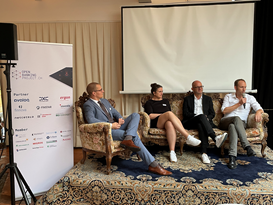We were joined by decision-makers from the financial industry, representatives of innovative fintechs, and the partners and members of OpenBankingProject.ch. We really appreciated being able to see many familiar faces in person again after such a long time. The welcoming atmosphere at Smith and the Luma provided the ideal setting for this. We would like to take this opportunity to thank everyone involved!
Eflamm Mordrelle, journalist at Finanz und Wirtschaft, once again professionally led us through the evening as moderator and opened the lecture series with the question of the progress of Open Banking in Switzerland. According to a study he cited, in the United Kingdom, the use of applications based on open banking totals 7%. And where do we stand? We are still waiting for the use of open banking here in Switzerland. With these words, he handed over to Thomas Zerndt, CEO of the Business Engineering Institute St. Gallen.
Thomas Zerndt, Business Engineering Institute St. Gallen
"OpenBankingProject.ch is committed to opening up by using interfaces in the sense of the end customer. We do not invent new interfaces, but operationalize existing ones and make them usable," says the host Thomas. Together with its partners and members, OpenBankingProject.ch has achieved and moved a lot in the last three years.
Thomas presented the vivid results of the tireless efforts. This includes the Swiss NextGen API, which is already in use, has been available since 2019 and has been in productive use at the Berner Kantonalbank since this summer. More on this later. Also, the contract template, which can be applied to the collaboration between a bank and a TPP in the API context, the OPN-Pay project, which enables online payments without an intermediary such as a credit card, or the ongoing community workshops in the area of "Customer Onboarding & KYC" and "Open Banking Network". The "Customer Onboarding & KYC" workshop series focuses in particular on the provision of standardized building blocks (e.g. API) for cross-company collaboration along the lifecycle of banking customers.
The Open Banking Network aims to enable efficient and sustainable connectivity between banks and TPPs using a hybrid model (analogous to the UK). For Thomas, it is essential that there continues to be an active exchange between the parties involved. This includes, among other activities, the exchange with the State Secretariat for International Financial SIF and Nicolas Brügger.
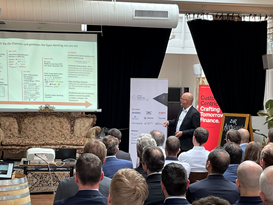
Paolo Sironi, IBM
Paolo Sironi, Global Research Leader for Banking and Financial Market at IBM, provided us with an insight into the role of banks and fintechs in the context of the platform economy as well as "Contextual and Conscious Banking". Concisely, Sironi stated that technologies are born in America, regulation in Europe, and business models in Asia. European banks are currently caught between legacy systems, central banks, the regulator and fintechs. Three contrasts in particular currently prevail:
- disruptive innovation against sustaining, high value innovation
- the asymmetry of information and mobile pull technology vs banking as a push industry
- the unbundling of open banking against rebundling on platforms and ecosystems
The asymmetry is particularly low for services with low complexity, such as payments and borrowing, which is why it is easy for fintechs to position their products successfully in these areas (pull technology). In contrast, more complex banking services (e.g. investment and insurance) are more difficult to sell without personal contact (push industry).
The two examples show that the complexity of the banking service is essential in the context of the push and pull mechanism. Banks want to generate additional output for themselves and increase assets under management. Here, Sironi points to the focus of the outcome. There is a difference whether the offering aims to meet the needs of the bank or those of the client. The investment vehicle may be the same, but the approach is different. The goal of banks should always be to help their customers achieve their own goals.
With these words, Sironi segues into conscious and contextual banking and points out other weaknesses in banks' current business models. The future is not about digitizing products, but much more about digitizing the relationship with the customer as a whole. In this context, open data, artificial intelligence and the business models themselves play an essential role in achieving the transition to conscious and contextual banking. This should help banks to achieve higher business value and ensure sustainably successful business operations.
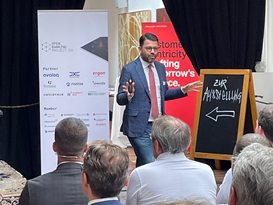
Shan Nazim (right), DXC and Dominik Wurzer, Contovista
The theory was followed by practical insights into a current implementation of open banking in Switzerland. Shan Nazim, Head Digitalization at DXC Technology and Dominik Wurzer, CEO of Contovista, presented the integration of Contovista via the open banking platform of the Berner Kantonalbank (BEKB) using the Swiss NextGen API. They proudly report about the process as well as the result and rightly say: "We just did it". These words from Shan Nazim should make us realize that open banking is not fiction, but already a tangible reality today.
The new BEKB service offers entirely new advantages to BEKB's private and also corporate customers. Private customers will receive an integrated personal Finance Manger (PFM) and corporate customers will receive a multibank-capable Finance Manger, which has a central financial cockpit with a view of the company's finances and thus enables precise planning and analysis of finances.
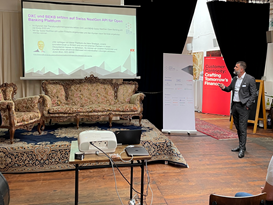
Tanja Libiseller, PPI
What is only very slowly getting off the ground for private customers as a whole has already been a reality for corporate customers for years and is also in active use at Swiss banks. Tanja addresses a very exciting implementation with the already long existing interface standard EBICS and shows which possibilities such interfaces would also open up for private customers.
How many customers would be happy if they could see an overview of all accounts, including pension plans, and at the same time receive a projection of retirement benefits for all assets, using just one application? Wouldn't the banks even strengthen the customer interface by opening it up? What if a customer in a furniture store were offered an installment loan at the checkout after unsuccessfully paying by card? Wouldn't that strengthen the relationship with the bank?
Finally, Tanja points out that banks themselves would also benefit from the use of open APIs. Especially in times of a pandemic, which allows even less real customer contact, open banking can be the key to opening up advantages for both the banks and their customers.
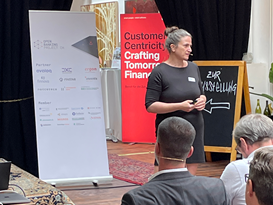
Nicolas Brügger, State Secretariat for International Financial Matters SIF
Nicolas' participation and also the title of his presentation "An opportunity for the financial sector, clients and the economy" underlines the importance of initiatives such as the OpenBankingProject.ch and the relevance of open finance for the Swiss financial center. SIF is following what is happening very closely and is also getting involved accordingly where necessary.
At the end of 2020, they had communicated a strategy describing their commitment to opening up the banks and convened a roundtable with Ueli Maurer where representatives of initiatives, associations and banks met for an exchange. At the same time, they are currently leaving it up to the market to find agreement and appropriate solutions. At the end of his contribution, Nicolas points out that it is important that the financial institutions address this topic actively and open up.
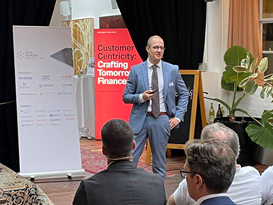
Panel discussion
In the final panel discussion, Nicolas Brügger, Tanja Libiseller, Thomas Zerndt, and Adrian Berger debated the relevance of open banking in Switzerland and what it would take for Switzerland to successfully move forward on this topic.
The experts' experiences indicated that it could be due to a lack of communication or even a lack of courage that open banking is only picking up speed very slowly in Switzerland. Another possible explanation is the lack of pain or pressure to change, to invest the appropriate resources and to prioritize open banking. As we already know, Switzerland is not subject to PSD2.
In this context, Nicolas explains that banks can thus invest where they want. This means that they are not forced to invest in interfaces for e.g. payment transactions or investments, but remain flexible. The regulator will not intervene today, but SIF will leave room for the market-driven approach and observe what happens. The regulator's task is to act when things are not moving fast enough. When the tipping point is reached remains an open question.
When asked about the UK's recipe, Adrian Berger points to the concept of private-public partnership. In the UK, the collaboration of banks, public authorities and TPPs has made it possible for open banking to already be widely used there (over 850 million API calls) across various services.
The event was topped off with an aperitif, where participants had the opportunity to connect with each other, reflect on the contributions, and concretize new implementations for open banking in Switzerland. We are already looking forward to the next Open Banking Summit in 2022 and to numerous participation, inspiring contributions and hopefully several implemented Swiss use cases, which we can jointly toast!
